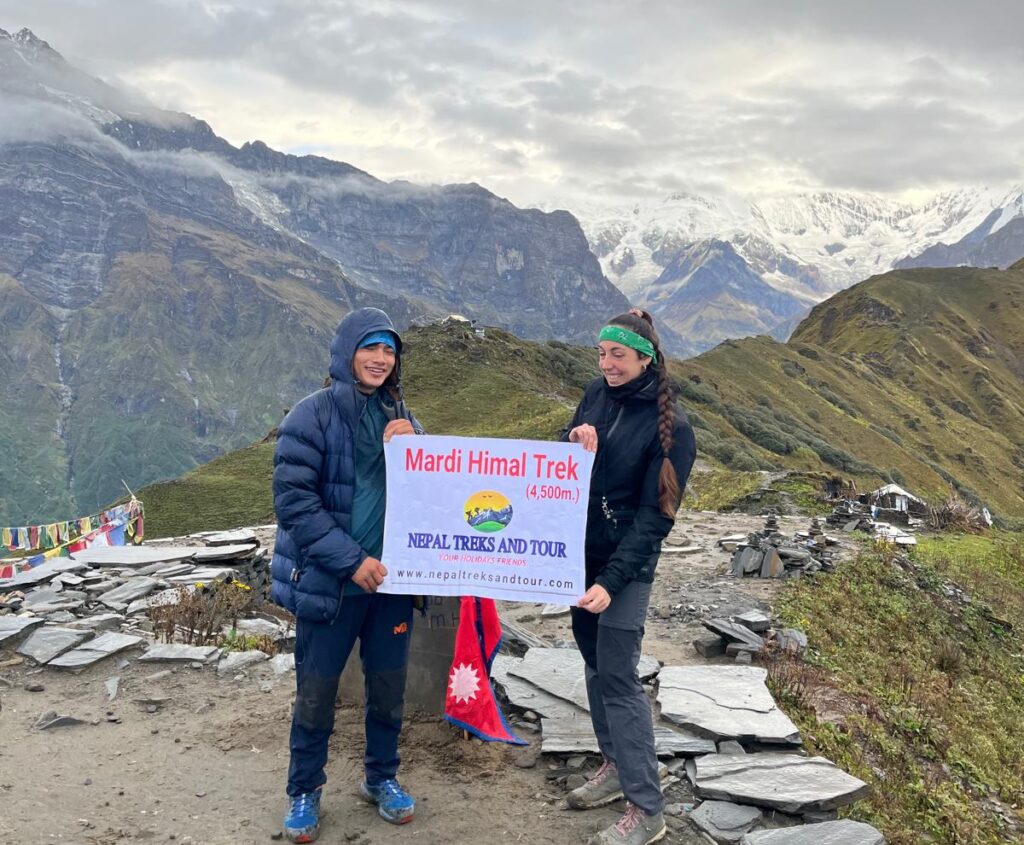If you’re searching for a peaceful, less-crowded trek in the Annapurna region that still offers breathtaking Himalayan views, the Mardi Himal Trek is your perfect adventure. But here’s the real secret: choosing the best time to trek Mardi Himal can completely transform your experience — from the clarity of mountain views to the comfort of your walk and even the vibe of the teahouses. In this detailed 2026 season guide, you’ll discover exactly when to trek Mardi Himal, what to expect in each season, and insider travel tips from local experts who know these trails inside out.
Mardi Himal Trek in Spring (March – May)
Focus: Blooming forests, clear skies, and warm trekking days
Best For: Nature lovers & photographers
Spring is one of the most beautiful seasons to trek Mardi Himal. The trail bursts with rhododendron blossoms, colorful forests, and pleasant temperatures.
Temperature: 10°C to 20°C (daytime), mild nights
Visibility: Excellent — snow peaks shine under blue skies
Highlights: Blooming flowers, wildlife sightings, and lively local villages
Insider Tip: April is the sweet spot — perfect balance of weather and fewer crowds than autumn.
Mardi Himal Trek in Monsoon (June – August)
Focus: Green landscapes, fewer trekkers, occasional rain
Best For: Adventure lovers and photographers seeking solitude
During monsoon, the trails get slippery and clouds often cover the peaks — but the hills turn lush green and waterfalls roar down every slope.
Temperature: 15°C to 25°C (warm but humid)
Scenery: Green forests, misty valleys, and dramatic clouds
Challenge: Leeches, slippery paths, occasional flight delays
Insider Tip: Choose early June or late August for fewer rains and better views.
Mardi Himal Trek in Autumn (September – November)
Focus: Clear skies, stable weather, and festival vibes
Best For: First-time trekkers & those seeking perfect mountain views
Autumn is the best time of the year to trek Mardi Himal. The weather is crisp, the visibility is crystal-clear, and the mountain views look unreal.
Temperature: 8°C to 18°C (comfortable days, cool nights)
Highlights: Panoramic views of Machhapuchhre, Annapurna South & Hiunchuli
Cultural Touch: Trek during Nepal’s biggest festivals – Dashain and Tihar
Insider Tip: Book teahouses early — October is the busiest trekking month in Nepal.
Mardi Himal Trek in Winter (December – February)
Focus: Peaceful trails, snow-capped forests, and quiet mountains
Best For: Off-season adventurers
Winter trekking in Mardi Himal is possible and magical — the mountains look closer than ever under a blanket of snow. But it’s also cold, especially above Forest Camp.
Temperature: Daytime 5°C to 10°C, night –5°C or lower
Scenery: Frozen landscapes, snow-dusted forests
Tips: Some teahouses above High Camp may close; carry warm gear
Insider Tip: Go in early December or late February for clearer skies and open lodges.
Quick Summary: Best Time for Mardi Himal Trek in 2026
| Season | Temperature | Weather | Highlights | Recommended |
|---|---|---|---|---|
| Spring (Mar–May) | 10°C–20°C | Clear, colorful | Flowers & mild temps | ✅ Excellent |
| Monsoon (Jun–Aug) | 15°C–25°C | Rainy, green | Fewer trekkers | ⚠️ Moderate |
| Autumn (Sep–Nov) | 8°C–18°C | Stable, sunny | Best visibility | 🌟 Best |
| Winter (Dec–Feb) | –5°C–10°C | Cold, clear | Snow views, quiet trails | ✅ Good (for experienced) |
Best Month Recommendation for 2026
Mid-March to Early May → Flower season, stable weather
Late September to Mid-November → Peak visibility, best conditions
Both windows are perfect for clear mountain views, safe trekking, and cozy teahouse stays.
Mardi Himal Trek Preparation Tips
Carry layers (base, fleece, and down jacket)
Use trekking poles for steep climbs
Bring microspikes in winter (for icy paths)
Stay hydrated — altitude reaches around 4,500m
Always check weather forecasts from Pokhara before you start
Bonus: Combine Mardi Himal with Poon Hill or Annapurna Base Camp
If you have extra days, you can combine Mardi Himal with:
Ghorepani Poon Hill Trek (3–4 days) – famous sunrise viewpoint
Annapurna Base Camp Trek (7 days) – complete Himalayan experience
This combo offers both low and high-altitude adventure with cultural variety.
Why Trek with Nepal Treks and Tour?
With years of experience guiding treks in the Annapurna region, our local team ensures safety, comfort, and authentic Nepali hospitality.
We customize treks based on your fitness, time, and travel season — so you enjoy the best of Mardi Himal, at the right time, your way.
Talk to our local experts today to plan your 2026 Mardi Himal adventure!
FAQs
1. What is the best time to do the Mardi Himal Trek in 2026?
March–May (spring) and September–November (autumn) offer the best weather, visibility, and trail conditions.
2. Is Mardi Himal Trek possible in winter?
Yes, but it’s cold. With proper gear and an experienced guide, it’s safe and stunning.
3. Can beginners trek Mardi Himal?
Absolutely. It’s a short, moderate trek suitable for first-timers in good fitness.
4. How long is the Mardi Himal Trek?
Usually 5–7 days from Pokhara, depending on your pace.
5. Do I need permits for Mardi Himal Trek?
Yes — ACAP (Annapurna Conservation Area Permit) and TIMS card are required.
6. Is Mardi Himal crowded in peak season?
Not as much as Annapurna Base Camp or EBC, but October sees moderate crowds.
7. What kind of accommodation is available?
Cozy teahouses with basic rooms, warm meals, and great mountain hospitality.
8. What’s the highest point of the trek?
Mardi Himal Base Camp at about 4,500 meters.
9. Is the trek suitable for solo travelers?
Yes, but going with a guide ensures safety and cultural insight.
10. Can I see snow during the trek?
Yes — especially from December to February and sometimes in early spring.
The Mardi Himal Trek takes you up to about 4,500m (Mardi Himal Base Camp) — high enough to enjoy majestic snow peaks but still accessible for most trekkers. Because it’s located in the Annapurna region, the weather follows the same rhythm as other classic routes like Annapurna Base Camp and Ghorepani.







